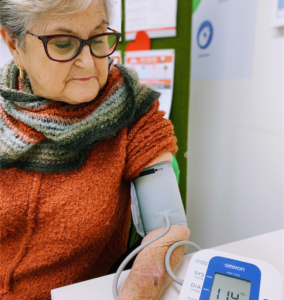THERE will be a free testing station at Calvary Hospital on Monday (September 16) to check anyone for whether they have an irregular heartbeat that increases the risk of stroke five-fold.

As part of a campaign developed in response to alarmingly low levels of testing for a heart condition known as atrial fibrillation, free screening for an irregular heartbeat will take place between 10am and 2pm.
Led by Hearts4Heart, the campaign comes as a nationwide survey of 550 people aged 65 and over reveals that only one-in-three older Australians has discussed their heart health with a doctor in the past 12 months, and only one-in-10 has discussed atrial fibrillation as a risk factor for cardiovascular disease in this period.
New medical guidelines recommend routine screening of people aged 65 years or older for atrial fibrillation. These guidelines state that one-in-10 strokes occur in people with previously undiagnosed atrial fibrillation.
“The research shows that on average older Australians see a doctor six times a year, which
provides plenty of opportunity to discuss and detect an irregular heartbeat,” said Tanya Hall, CEO of patient support group Hearts4Heart.
Ms Hall, an atrial fibrillation patient herself, is advocating for pulse and heart rate testing to
become routine for people aged over 65 years when seeing their doctor.
When undiagnosed and untreated, an irregular heartbeat can cause blood to pool in a
chamber of the heart and form a clot that can travel to the brain, causing a devastating stroke.
“Atrial fibrillation-related strokes can be prevented, but diagnosis remains the critical first step. It is estimated that one-in-four strokes occur in people with atrial fibrillation,” she said.
“We don’t want a stroke to be the first time any Australian discovers they have an irregular
heartbeat. Pulse and heart-rate testing is quick, it’s simple and could ultimately save lives.”
Early diagnosis of atrial fibrillation must be matched by long-term use of medication that can reduce the risk of stroke by up to 70 per cent, but a new analysis produced for Hearts4Heart reveals that around 25 per cent of people prescribed anticoagulation medicine to prevent stroke discontinue therapy within 12 months.
“This is alarming. We need to ensure people with atrial fibrillation understand why they’ve
been prescribed an anticoagulant and why they need to continue to take this medication
over the long term,” Ms Hall said.
More at hearts4heart.org.au
Who can be trusted?
In a world of spin and confusion, there’s never been a more important time to support independent journalism in Canberra.
If you trust our work online and want to enforce the power of independent voices, I invite you to make a small contribution.
Every dollar of support is invested back into our journalism to help keep citynews.com.au strong and free.
Thank you,
Ian Meikle, editor





Leave a Reply